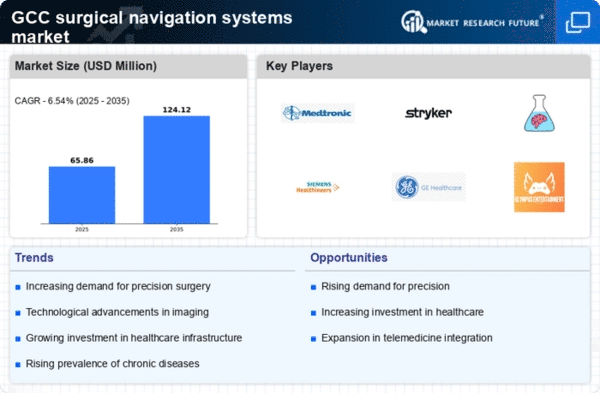Expansion of Medical Tourism
The GCC region is witnessing a surge in medical tourism, which is positively impacting the surgical navigation-systems market. Patients from various countries are seeking advanced surgical procedures in GCC nations due to the availability of state-of-the-art medical technologies and skilled healthcare professionals. This influx of international patients is prompting local healthcare facilities to invest in advanced surgical navigation systems to cater to the growing demand for high-quality surgical services. As medical tourism continues to expand, the surgical navigation-systems market is likely to experience increased growth opportunities.
Surge in Healthcare Expenditure
Healthcare expenditure in the GCC is on an upward trajectory, which positively influences the surgical navigation-systems market. Governments in the region are allocating substantial budgets to enhance healthcare infrastructure and technology. For instance, the healthcare spending in Saudi Arabia is expected to exceed $50 billion by 2025, reflecting a commitment to modernizing medical facilities. This increase in funding allows for the procurement of advanced surgical navigation systems, which are essential for improving surgical precision and patient safety. As healthcare facilities upgrade their technologies, the surgical navigation-systems market is likely to benefit from this financial support.
Rising Prevalence of Chronic Diseases
The surgical navigation-systems market is experiencing growth due to the increasing prevalence of chronic diseases in the GCC region. Conditions such as cardiovascular diseases, diabetes, and orthopedic disorders necessitate advanced surgical interventions. As healthcare providers seek to improve patient outcomes, the demand for precise surgical navigation systems rises. According to recent data, the incidence of diabetes in the GCC is projected to reach 20% by 2030, driving the need for effective surgical solutions. This trend indicates a potential expansion in the surgical navigation-systems market, as hospitals and clinics invest in technologies that enhance surgical accuracy and reduce recovery times.
Integration of Artificial Intelligence
The integration of artificial intelligence (AI) into surgical navigation systems is emerging as a key driver in the surgical navigation-systems market. AI technologies enhance the capabilities of navigation systems by providing real-time data analysis and predictive analytics, which can significantly improve surgical outcomes. In the GCC, hospitals are increasingly adopting AI-driven solutions to streamline surgical workflows and enhance decision-making processes. This trend indicates a potential shift in the surgical navigation-systems market, as AI integration may lead to more efficient surgeries and better patient care.
Growing Awareness of Surgical Precision
There is a notable increase in awareness regarding the importance of surgical precision among both healthcare professionals and patients in the GCC. This heightened awareness is driving the adoption of surgical navigation systems, which are designed to enhance the accuracy of surgical procedures. As patients become more informed about their treatment options, they are more likely to seek out facilities that utilize advanced technologies. This trend suggests that the surgical navigation-systems market may see a rise in demand as healthcare providers strive to meet patient expectations for high-quality surgical care.
















